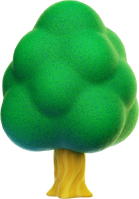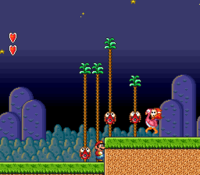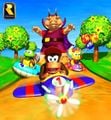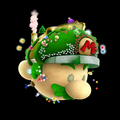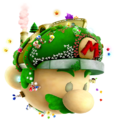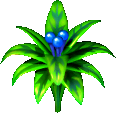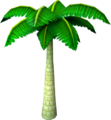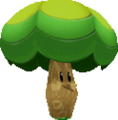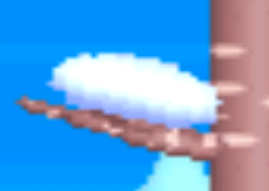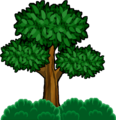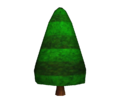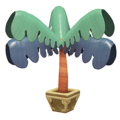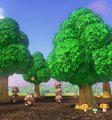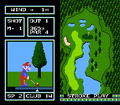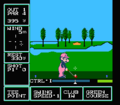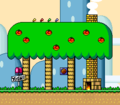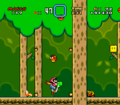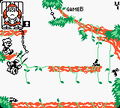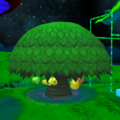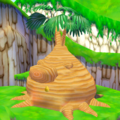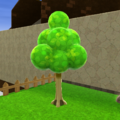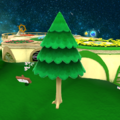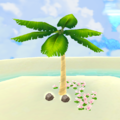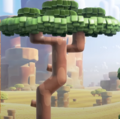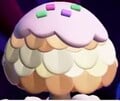Tree
Trees in the Super Mario franchise are large plants that mostly represent decorative elements, and occasionally as obstacles for obstructing enemies or being physical barriers. However, they are usually climbable and may hide items, especially in the three-dimensional games of the Super Mario series.
History[edit]
Donkey Kong Jr. (Game & Watch)[edit]
Donkey Kong Jr. for the Game & Watch and its modern variants in the Game & Watch Gallery series involves the titular character's navigating through a tree to rescue Donkey Kong from Mario. The tree provides vines for Donkey Kong Jr. to swing from and avoid enemies. Donkey Kong Jr. can also drop fruits to defeat enemies for bonus points.
Mario's Bombs Away[edit]
In Mario's Bombs Away, palm trees hide Mario's enemies. While Mario is carrying a bomb, enemies emerge from the fronds to try to light it.
Super Mario series[edit]
Super Mario Bros. 2[edit]
In Super Mario Bros. 2, palm trees are common throughout Subcon, with their leaves being shared with those on the tops of vines. While the player cannot interact with them directly, Hoopsters are able to climb on them as though they were vines.
Super Mario World / Super Mario World: Super Mario Advance 2[edit]
Yoshi's House, which first appears in Super Mario World and Super Mario World: Super Mario Advance 2, consists of a large tree with berries for Yoshi to lay an egg. The tree is also visible on the world map of Dinosaur Land, marking the level. In Forest of Illusion, levels containing densely populated trees, also bearing fruit, can obscure the player, enemies, and items.
Super Mario 64[edit]
In Super Mario 64, Mario can climb on top of trees in the same manner as poles. In different areas, trees take on different appearances, with the castle's back courtyard and the snowy areas having a star-shaped conifer appearance. In some cases, climbing to the top causes a 1-Up Mushroom to spawn. In Whomp's Fortress, a tree contains Hoot in later missions. In Super Mario 64 DS, Hoot appears in trees in other levels as well.
If Mario long-jumps onto the tree's trunk, then he will swing around it briefly. In the Shindou re-release of the game, he will still swing, but not as far.
Super Mario Sunshine[edit]
Trees[1] appear throughout Super Mario Sunshine. They are occasionally covered in goop and will sprout up when it is cleared away, although some in Gelato Beach are simply spawned from spraying in certain areas without the addition of goop. Some trees have a harmless spiky area near the leaves preventing Mario from climbing all the way up one. Pianta Village is centered around a particularly large tree. A baobab-like tree is in Pinna Park and resembles a Pianta head, having some X Graffiti on the front and a papaya dangling from the nose.
New Super Mario Bros.[edit]
In World 5-1 from New Super Mario Bros., some trees have heavy snow on their branches. If Mario approaches them, the snow falls and can potentially trap him.
Super Mario Galaxy[edit]
While Super Mario Galaxy does not feature trees that Mario (or Luigi) can directly interact with, there are tree stumps he can Ground Pound on to trigger various effects. The Bell on the Big Tree is a hidden mission in Gold Leaf Galaxy where Mario navigates in a bubble around a large tree. He can activate a bell on this tree to spawn music notes that wrap around tree trunk. While floating, he can collect these music notes to earn a Power Star.
New Super Mario Bros. Wii[edit]
Palm trees, found in beach levels and having various heights, act as platforms for the player. Some bear fruit for Yoshi to eat.
Super Mario Galaxy 2[edit]
Mario (or Luigi) can climb broad-leaf and conifer trees in Super Mario Galaxy 2, similar to poles. Palm trees, however, have fronds that Mario can stand on. A giant tree in Tall Trunk Galaxy is featured. Mario can scale this tree depending on the design of the mission he is in. For The Flotacious Blimp Fruit, he requires Blimp Yoshi. In Tall Trunk's Big Slide, he instead jumps through swings.
The Whittle species, which are tree spirits, are introduced. They consider the tree in Tall Trunk Galaxy to be sacred.
The stumps from Super Mario Galaxy also return.
Super Mario 3D Land[edit]
In Super Mario 3D Land, trees are common in grass-themed levels, like World 1-1. The crowns of the trees in this game have a globe-like shape with several layers of leaves. Mario or Luigi can climb them like in Super Mario 64 and will cause them to shake softly upon doing so. Usually, climbing to the top of a tree will reveal an item, such as a Coin, Super Leaf or 1-Up Mushroom.
Trees with this specific design also appear as background elements in New Super Mario Bros. 2, two Super Mario stages in Super Smash Bros. for Nintendo 3DS and Super Smash Bros. Ultimate (3D Land and Golden Plains) and in Super Mario Maker 2's Story Mode hub.
Tail Trees, a variant with tail-like branches that bears Super Leaves, make their first appearance.
New Super Mario Bros. U / New Super Luigi U / New Super Mario Bros. U Deluxe[edit]
In New Super Mario Bros. U, New Super Luigi U and New Super Mario Bros. U Deluxe, trees appear in various levels in the game, mostly levels in Layer-Cake Desert and Sparkling Waters. In these levels, they act as platforms that can be stood on. Waddlewings can also cling onto trees. Some trees release coins if the player performs a Ground Pound on their leaves or performs a Spin Jump into the leaves from below.
Super Mario 3D World / Super Mario 3D World + Bowser’s Fury[edit]
Trees appear in various levels in Super Mario 3D World, occasionally releasing coins or Mini Goombas when the player climbs to the top. A unique type of tree with a white trunk and a yellow and orange-striped crown of leaves in the shape of a Super Bell also makes multiple appearances throughout the game, primarily in World 1. They appear in varying heights, ranging from short to extremely tall, even taller than Mega Mario at their tallest. Unlike the other tree types, if the player climbs to the top, a Super Bell will often appear and fall to the ground. When climbed on, these trees emit a bell jingling sound (the same happens when the player touches one with the Wii U GamePad). Trees can be destroyed by walking into them while under the effects of a Mega Mushroom.
Trees return in the Bowser's Fury campaign of Super Mario 3D World + Bowser's Fury, where the trees' bushes have cat-like ears on the top. In the Lakeside region, they are green; in the Ruins region, they are light blue; and in the Wasteland region, they are red. If Mario rolls into a tree, the player earns a single coin.
Super Mario Odyssey[edit]
A fir tree that appears in the Deep Woods area of the Wooded Kingdom from Super Mario Odyssey can be captured with Cappy. This is indicated by a small, green orb on the top of it. If Mario captures the tree, he can move around by moving . This is required in order to obtain a Power Moon in a glowing spot that is hidden underneath the tree. Unlike the more realistic trees in the game, this tree's design greatly resembles that of Super Mario 3D World. Several climbable trees with designs based on those of the trees in Super Mario 64 appear throughout the Mushroom Kingdom.
Super Mario Maker 2[edit]
Trees reappear as a course element in Super Mario Maker 2 in the Super Mario 3D World style (marking their first interactive appearance in a 2D game), where their height can be altered in a manner similar to pipes. Their designs vary between level themes, with most themes' trees taking the form of the Super Bell trees seen in the original game. In the Desert theme, they resemble palm trees; in the Underwater theme, they take on a puffed pink appearance; in the Forest theme, they take on a more generic appearance and spherical shape; and in the Snow theme, they resemble snow-covered conifers. Items can also be placed inside of them, and if the player climbs to the top, the item will pop out of it.
Super Mario Bros. Wonder[edit]
In Super Mario Bros. Wonder, special trees appear in certain levels such as Bulrush Coming Through!. Players can identify them when the trees buckle slightly under them. When players Ground Pound on them, they can alter the elevation of these trees. One tree, indicated by vertical coins, leads the player to a secret sky area to find a 10-flower coin.
Short pink trees in Maw-Maw Mouthful provide Goomba Mario cover to prevent Maw-Maws from eating him.
Diddy Kong Racing / Diddy Kong Racing DS[edit]
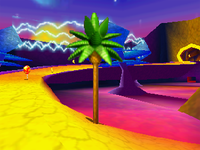
Various types of trees serve as hazards in Diddy Kong Racing and its remake Diddy Kong Racing DS. Their appearance varies on the location, with temperate areas featuring broad-leaved trees, tropical areas featuring palms (Spacedust Alley, however, contains palm trees), and mountain and snow areas with conifers. When racers hit trees, they lose speed or even stop, and the tree makes a cartoonish wobbling noise. Some other trees are more simple obstacles, such as the large palms supporting the race banner in Whale Bay.
Yoshi's Story[edit]
- Main article: Super Happy Tree
The Super Happy Tree in Yoshi's Island is central to the plot of Yoshi's Story. Including the central Heart Fruit, it grows all fruits on the island and provides happiness to the inhabitants.
Mario Golf series[edit]
Trees are common obstacles throughout golf courses in the Mario Golf series. Trees interfere with the paths of balls, such as having balls bounce off trunks, or the leaves slow, if not stop their trajectory. In Mario Golf: World Tour, Fire Flower-powered shots can burn through tree cover, and Special Shots in Mario Golf: Super Rush can pierce through foliage (since version 2.0.0). If golf balls are stuck in trees, or if they land too close to a tree, making them unplayable, players take a hazard penalty and add one stroke to their score.
Donkey Kong 64[edit]
Climbable palm trees appear in Jungle Japes, Angry Aztec, and around DK's Tree House in Donkey Kong 64. These trees have leaves that can be walked on. Some treetops contain items, such as Banana Bunches.
Mario Party series[edit]
In Mario Party 2, Woody, a large friendly tree, first appears and sells minigames. Evil Woody, his blue counterpart, first appears in Mario Party 3. The Mario Party series has several tree-themed boards including Woody Woods and Towering Treetop that has sentient trees, including Woody and Evil Woody. Mega Wiggler's Tree Party takes place in an orchard.
Trees are also featured in several minigames. Players drop coconuts from palm trees in Coconut Conk to defeat the solo player. Players shoot down fruits from a large tree in Berry Basket so their teammates can collect fruits. In Banana Shake, players shake trees to gain bananas while avoiding falling hammers. In Trick or Tree, dark sentient trees shuffle, and players must guess and choose the highest tree to win. In Something's Amist, trees (the same ones from Trick or Tree) look at the location of the hidden gem. A board-specific item minigame Treasure Tree, can be played in Shy Guy's Jungle Jam in Mario Party 4. Players under the effects of the Mini Mushroom can receive one of the three items that are swinging from the tree.
Paper Mario series[edit]
Trees in Paper Mario and other games of the Paper Mario series have appeared as interactable objects. Trees are not climbed, but Mario can hit them with a hammer, potentially causing items to drop from them. In Paper Mario: Sticker Star, Whammino Mountain features trees with no leaves that can be hammered to cause them to spin and fall over. Later in the level Mario can tip over one of these trees to start a long, destructive chain of events, similar to a Rube Goldberg machine, to eventually release the white gate scrap, so he can proceed with the level. In Paper Mario: The Origami King, hammering trees can cause them to drop infinite amounts of Confetti, which is mandatory to progress through the game.
Captain Toad: Treasure Tracker[edit]
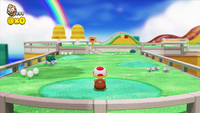
Super Bell trees from Super Mario 3D World reappear in the Wii U version of Captain Toad: Treasure Tracker in the same locations in Super Bell Hill, the first level of the Bonus Episode.
The Super Mario Bros. Movie[edit]
In The Super Mario Bros. Movie, green bell-shaped trees, referencing the Super Bell trees from Super Mario 3D World, can be seen scattered throughout the Mushroom Kingdom, mainly around Peach's Castle in Toad Town.
Mario & Luigi: Brothership[edit]
In Mario & Luigi: Brothership, a Uni-Tree (a word play on the term "unity"), the mast and sail of the Shipshape Island, serves as a central plot point by connecting and unifying all districts in Concordia with the power of Connectar. It is planted on the island to help restore the lands after an older, larger Uni-Tree was destroyed and fractured them.
Profiles[edit]
Super Mario 3D Land[edit]
- Website description:
- English (British):
Try climbing right to the very top...[2] - Other languages:
- Dutch:
Probeer helemaal naar boven te klimmen...[3] - French (Europe):
Essayez de grimper tout en haut des arbres...[4] - German:
Versuche, bis ganz nach oben zu klettern![5] - Italian:
Cerca di salire fino alla cima...[6] - Portuguese (Portugal):
Experimenta subir até ao topo...[7] - Spanish (Europe):
Intenta subir por ellos hasta la copa…[8]
- Dutch:
- English (British):
Gallery[edit]
Artwork[edit]
Sprites and models[edit]
Mario Kart DS (unused)
Mario Kart 8 (unused)
Screenshots[edit]
Game & Watch Gallery 3 (Donkey Kong Jr.)
Game & Watch Gallery 4 (Donkey Kong Jr.)
Merchandise[edit]
Dixie Kong's Jungle Jam from LEGO Super Mario
DK's Tree House from LEGO Super Mario
Additional names[edit]
Internal names[edit]
| Game | File | Name | Meaning
|
|---|---|---|---|
| Super Mario Bros. Wonder (pink tree) | G:/romfs/Model/ObjectGrowPlants.bfres.zs | GrowPlants | - |
Names in other languages[edit]
| Language | Name | Meaning | Notes |
|---|---|---|---|
| Japanese | 木[?] Ki |
Tree | |
| Chinese (simplified) | 树[?] Shù |
Tree | |
| Chinese (traditional) | 樹[?] Shù |
Tree | |
| Dutch | Boom[?] | Tree | |
| French | Arbre[?] | Tree | |
| German | Baum[?] | Tree | |
| Italian | Albero[?] | Tree | |
| Russian | дерево[?] Derevo |
Tree | |
| Spanish | Árbol[?] | Tree |
See also[edit]
References[edit]
- ^ Averill, Alan, and Jennifer Villarreal (2002). Super Mario Sunshine: The Official Nintendo Player's Guide. Redmond, WA: Nintendo of America (English). ISBN 1-930206-23-2. Page 59.
- ^ Official website of Super Mario 3D Land (UK & Ireland) § The Game World. nintendo.co.uk. Retrieved November 14, 2024. (Archived April 8, 2024, 21:51:15 UTC via archive.today.)
- ^ Official website of Super Mario 3D Land (Netherlands) § De spelwereld. nintendo.nl. Retrieved November 14, 2024. (Archived April 8, 2024, 22:04:22 UTC via archive.today.)
- ^ Official website of Super Mario 3D Land (France) § L'univers de jeu. nintendo.fr. Retrieved November 14, 2024. (Archived April 8, 2024, 22:06:33 UTC via archive.today.)
- ^ Official website of Super Mario 3D Land (Germany) § Die Spielwelt. nintendo.de. Retrieved November 14, 2024. (Archived April 8, 2024, 22:08:36 UTC via archive.today.)
- ^ Official website of Super Mario 3D Land (Italy) § Il Mondo di gioco. nintendo.it. Retrieved November 14, 2024. (Archived April 8, 2024, 22:10:30 UTC via archive.today.)
- ^ Official website of Super Mario 3D Land (Portugal) § O mundo do jogo. nintendo.pt. Retrieved November 14, 2024. (Archived April 8, 2024, 22:02:03 UTC via archive.today.)
- ^ Official website of Super Mario 3D Land (Spain) § Mundo del juego. nintendo.es. Retrieved November 14, 2024. (Archived April 8, 2024, 22:00:02 UTC via archive.today.)
| Links to related articles | |||||||||||||||||||||||||||||||||||||||||||||||||||||||||||||||||||||||||||||||||||||||||||||||||||||||||||||||||||||||||||||||||||||||||||||||||||||||||||||||||||||||||||||||||||||||||||||||||||||||||||||||||||||||||||||||||||||||||||||||||||||||||||||||||||||||||||||||||||||||||||||||||||||||||||||||||||||||||||||||||||||||||||||||||||||||||||||||||||||||||||||||||||||||||||||||||||||||||||||||||||||||||||||||||||||||||||||||||||||||||||||||||||||||||||||||||||||||||||||||||||||||||||||||||||||||||||||||||||||||||||||||||||||||||||||||||||||||||||||||||||||||||||||||||||||||||||||||||||||||||||||||||||||||||||||||||||||||||||||||||||||||||||||||||||||||||||||||||||||||||||||||||||||||||||||||||||||||||||||||||||||||||||||||||||||||||||||||||||||||||||||||||||||||||||||||||||||||||||||||||||||||||||||||||||||||||||||||||||||||||||||||||||||||||||||||||||||||||||||||||||||||||||||||||||||||||||||||||||||||||||||||||||||||||||||||||||||||||||||||||||||||||||||||||||||||||||||||||||||||
|---|---|---|---|---|---|---|---|---|---|---|---|---|---|---|---|---|---|---|---|---|---|---|---|---|---|---|---|---|---|---|---|---|---|---|---|---|---|---|---|---|---|---|---|---|---|---|---|---|---|---|---|---|---|---|---|---|---|---|---|---|---|---|---|---|---|---|---|---|---|---|---|---|---|---|---|---|---|---|---|---|---|---|---|---|---|---|---|---|---|---|---|---|---|---|---|---|---|---|---|---|---|---|---|---|---|---|---|---|---|---|---|---|---|---|---|---|---|---|---|---|---|---|---|---|---|---|---|---|---|---|---|---|---|---|---|---|---|---|---|---|---|---|---|---|---|---|---|---|---|---|---|---|---|---|---|---|---|---|---|---|---|---|---|---|---|---|---|---|---|---|---|---|---|---|---|---|---|---|---|---|---|---|---|---|---|---|---|---|---|---|---|---|---|---|---|---|---|---|---|---|---|---|---|---|---|---|---|---|---|---|---|---|---|---|---|---|---|---|---|---|---|---|---|---|---|---|---|---|---|---|---|---|---|---|---|---|---|---|---|---|---|---|---|---|---|---|---|---|---|---|---|---|---|---|---|---|---|---|---|---|---|---|---|---|---|---|---|---|---|---|---|---|---|---|---|---|---|---|---|---|---|---|---|---|---|---|---|---|---|---|---|---|---|---|---|---|---|---|---|---|---|---|---|---|---|---|---|---|---|---|---|---|---|---|---|---|---|---|---|---|---|---|---|---|---|---|---|---|---|---|---|---|---|---|---|---|---|---|---|---|---|---|---|---|---|---|---|---|---|---|---|---|---|---|---|---|---|---|---|---|---|---|---|---|---|---|---|---|---|---|---|---|---|---|---|---|---|---|---|---|---|---|---|---|---|---|---|---|---|---|---|---|---|---|---|---|---|---|---|---|---|---|---|---|---|---|---|---|---|---|---|---|---|---|---|---|---|---|---|---|---|---|---|---|---|---|---|---|---|---|---|---|---|---|---|---|---|---|---|---|---|---|---|---|---|---|---|---|---|---|---|---|---|---|---|---|---|---|---|---|---|---|---|---|---|---|---|---|---|---|---|---|---|---|---|---|---|---|---|---|---|---|---|---|---|---|---|---|---|---|---|---|---|---|---|---|---|---|---|---|---|---|---|---|---|---|---|---|---|---|---|---|---|---|---|---|---|---|---|---|---|---|---|---|---|---|---|---|---|---|---|---|---|---|---|---|---|---|---|---|---|---|---|---|---|---|---|---|---|---|---|---|---|---|---|---|---|---|---|---|---|---|---|---|---|---|---|---|---|---|---|---|---|---|---|---|---|---|---|---|---|---|---|---|---|---|---|---|---|---|---|---|---|---|---|---|---|---|---|---|---|---|---|---|---|---|---|---|---|---|---|---|---|---|---|---|---|---|---|---|---|---|---|---|---|---|---|---|---|---|---|---|---|---|---|---|---|---|---|---|---|---|---|---|---|---|---|---|---|---|---|---|---|---|---|---|---|---|---|---|---|---|---|---|---|---|---|---|---|---|---|---|---|---|---|---|---|---|---|---|---|---|---|---|---|---|---|---|---|---|---|---|---|---|---|---|---|---|---|---|---|---|---|---|---|---|---|---|---|---|---|---|---|---|---|---|---|---|---|---|---|---|---|---|---|---|---|---|---|---|---|---|---|---|---|---|---|---|---|---|---|---|---|---|---|---|---|---|---|---|---|---|---|---|---|---|---|---|---|---|---|---|---|---|---|---|---|---|---|---|---|---|---|---|---|---|---|---|---|---|---|---|---|---|---|---|---|---|---|---|---|---|---|---|---|---|---|---|---|---|---|---|---|---|---|---|---|---|---|---|---|---|---|---|---|---|---|---|---|---|---|---|---|---|---|---|---|---|---|---|---|---|---|---|---|---|---|---|---|---|---|---|---|---|---|---|---|---|---|---|---|---|---|---|---|---|---|---|---|---|---|---|---|---|---|---|---|---|---|---|---|---|---|---|---|---|---|---|---|---|---|---|---|---|---|---|---|---|---|---|---|---|---|---|---|---|---|---|---|---|---|---|---|---|---|---|---|---|---|---|---|---|---|---|---|---|---|---|---|---|---|---|---|---|---|---|---|---|---|---|---|---|---|---|---|---|---|---|---|---|---|---|---|---|---|---|---|---|---|---|---|---|---|---|---|---|---|---|---|---|---|---|---|---|---|---|---|---|---|---|---|---|---|---|---|---|---|---|---|---|---|---|---|---|---|---|---|---|---|---|---|---|---|---|---|---|---|---|---|
| |||||||||||||||||||||||||||||||||||||||||||||||||||||||||||||||||||||||||||||||||||||||||||||||||||||||||||||||||||||||||||||||||||||||||||||||||||||||||||||||||||||||||||||||||||||||||||||||||||||||||||||||||||||||||||||||||||||||||||||||||||||||||||||||||||||||||||||||||||||||||||||||||||||||||||||||||||||||||||||||||||||||||||||||||||||||||||||||||||||||||||||||||||||||||||||||||||||||||||||||||||||||||||||||||||||||||||||||||||||||||||||||||||||||||||||||||||||||||||||||||||||||||||||||||||||||||||||||||||||||||||||||||||||||||||||||||||||||||||||||||||||||||||||||||||||||||||||||||||||||||||||||||||||||||||||||||||||||||||||||||||||||||||||||||||||||||||||||||||||||||||||||||||||||||||||||||||||||||||||||||||||||||||||||||||||||||||||||||||||||||||||||||||||||||||||||||||||||||||||||||||||||||||||||||||||||||||||||||||||||||||||||||||||||||||||||||||||||||||||||||||||||||||||||||||||||||||||||||||||||||||||||||||||||||||||||||||||||||||||||||||||||||||||||||||||||||||||||||||||||
- Trees
- Capturable
- Bowser's Fury objects
- Captain Toad: Treasure Tracker objects
- Diddy Kong Racing
- Donkey Kong 64 objects
- Paper Mario objects
- Paper Mario: The Thousand-Year Door objects
- Super Mario 3D Land objects
- Super Mario 3D World objects
- Super Mario 64 objects
- Super Mario Bros. Wonder objects
- Super Mario Galaxy 2 objects
- Super Mario Maker 2 objects
- Super Mario Odyssey objects
- Super Mario Sunshine objects
- The Super Mario Bros. Movie objects
